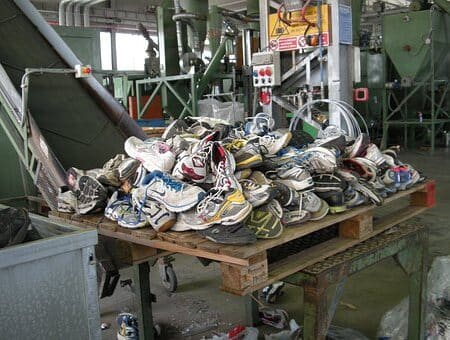
Pakistan Institute of Development Economics
- Home
Our Portals
MenuMenuMenuMenuMenuMenuMenu - ResearchMenuMenuMenuMenuMenuMenuMenu
- Discourse
- The PDR
- Our Researchers
- Academics
- Degree Verification
- Thesis Portal
- Our Portals

Circular Economy: A Need for the 21st Century
We buy clothes and throw them away in dustbins when they get old, we buy shoes and throw them too when they don’t remain usable, we buy utensils and throw them in dustbin too when they broke up or get so old and same is our attitude with lot of other products lying in our households. Not surprisingly, we are among the top waste producing countries in the world, producing about 71,000 tons of just solid waste daily.
All over the world, especially developing countries like Pakistan are following above mentioned practice of take, make and waste. That is we take raw materials, convert these into furnished goods, use these goods and then throw them away. However there is a better way to break this vicious cycle of take, make and waste and that is Circular Economy (CE). This new concept is about leaving the old bad practice and replacing it with a new strategy of take, make and recycle or reuse. This new strategy could help to save our country’s precious resources and can make a great impact to improve its overall environment.

UK based Ellen MacArthur Foundation (EMAF), is doing a great job by waking up world leaders and creating awareness among the public. Never at any point, would anything made within a Circular Economy become a waste – Ellen MacArthur, the founder of EMAF.
Does CE Offer Some Financial Benefits as Well?
The idea of Circular Economy does not focus just on the recycling of resources to preserve Planet Earth, but it will be an appealing avenue in terms of financial benefits as well. Hence it has been estimated by McKinsey consultancy that a circular economy model could save the European Union 1,800 billion euros till 20301.
Extending the lifetime of a product seems contradictory for a production company, as it appears to reduce revenue in the short term; the sales figures fall because you are selling fewer new products and many companies focus primarily on the cost-oriented demand side. However, strategies to extend the lifetime or rather the service life of a product can create additional value in the long term.
It is in fact nature’s way of doing things because nature does not waste anything as we all witness in the case of water cycle. Being Muslims and the claimant to be inheritors of God’s reign on Earth, we have greater responsibility for conserving Earth’s resources.
Applying Circular Economy to the Practical World
Idea of circular economy is applicable to almost every industry – whether its clothing, construction, food, automobiles, telecom or furniture. In Circular Economy based model, new buildings will be constructed of recyclable materials and modules. Therefore, building material would be dismantled easily when the building is no more required or needs to be repaired or refurbished. In fact the new construction model suggested by Circular Economy proponents sees only building’s land belonging to the owner and rest all residing in it, along with the building material to the initial supplier. It is not paying for things and material but for the time period for which these are in use. Consequently, suppliers will take a good care of the provided things, hence enhancing product’s life and usability. Such practices are already in place by companies like Volkswagen, which manufacture Boeing engines but retain their ownership and the careers provide not for the engine but for the number of flying hours.
Further many counties in the world have already started applying this beneficial concept in their economies. For example the government of Netherlands aims to use fifty percent less primary raw materials for construction projects by 2030. Indeed that is a tough target for the sector. This means that in about 12 years’ time, a construction project will have to be designed and built in such a way that the materials and construction elements can be reused in a straightforward manner, according to Petran Van Heel-Sector Banker, Construction & Real Estate Manager at ABN AMRO2 Bank.
Why We Desperately Need this Model in Pakistan?
In a country like Pakistan we are loaded with tons of waste everywhere, so we are in much more need for such a reusable policy especially in the construction industry. The present government has pledged to build five million houses in the country during their five years tenure. Rather than following old construction policies and procedures, government needs to introduce people to the concept of Circular Economy.

Without a doubt implementing these policies will be a huge challenge given less awareness among people about such concepts. However getting the same done directly by the government could be a much easier task. Further implementing this model on a large scale could become a good reference for the entire world especially developing countries. It might become a new source of international funding and support honoring Pakistan’s initiative for preservation of the planet.
Conclusion
Finally, role of government and educational institutes is very important in creating awareness about this beneficial concept. Appropriate measures need to be taken to make this a firm part of policy by introducing new laws and procedures. Banking role, especially those of Islamic banks, is very important in promoting this idea among business people. ABN AMRO, with ING and Rabobank, published financial guidelines in 2018 for clarifying projects which genuinely lie under CE. It is therefore a good reference to follow for Pakistani banks too. Banks can shift their investment and funding portfolio, for individuals and organizations, from conventional projects to CE-based ones to make this idea a reality.
Download full PDF


